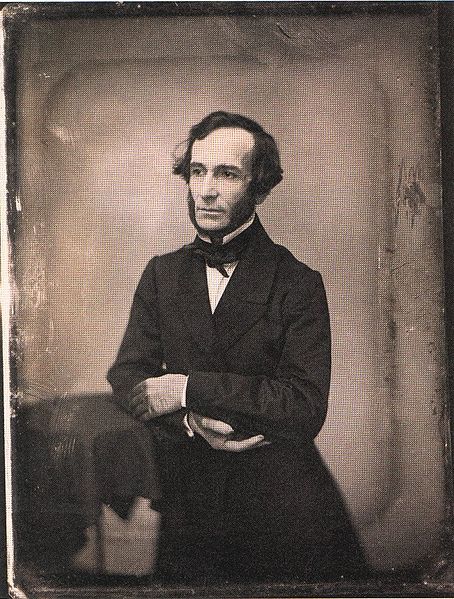<Back to Index>
- Astronomer Jan Śniadecki, 1756
- Poet Edward Carpenter, 1844
- Diplomat and Political Theorist Juan Bautista Alberdi, 1810
PAGE SPONSOR

Juan Bautista Alberdi (August 29, 1810 – June 19, 1884) was an Argentine political theoristand diplomat. Although he lived most of his life in exile in Montevideo and Chile, he was one of the most influential Argentine liberals of his age.
Juan Bautista Alberdi was born in San Miguel de Tucumán, capital city of the province of Tucumán, Argentina, in the year of the May Revolution, the beginning of Argentine emancipation from the motherland, Spain. His father, Salvador Alberdi, was a Spanish merchant; his mother, Josefa Aráoz y Balderrama, had been born into an Argentine family of Spanish descent. She died as a result of Juan Bautista's birth.
Alberdi's family had supported the Argentine Revolution from the beginning. His father was close to Belgrano, an important revolutionary, who had a decisive influence on the life and work of young Alberdi.
Juan Bautista Alberdi moved at an early age to Buenos Aires, where he studied in the "Colegio de Ciencias Morales" (roughly, a secondary school for study of social sciences). But in 1824, because of his love of music, he briefly and prematurely abandoned his studies. He soon resumed those studies, preparing to become a lawyer. He continued those studies in Córdoba and in 1840 finished them in Montevideo. During this process, his ability to teach himself stands out, besides his formal studies.
Because of his participation in the Argentine "Generation of '37", a group of young and liberal intellectuals heavily influenced by the Enlightenment and liberal thought (among these young men were, also, Esteban Echeverría and Domingo Faustino Sarmiento), and his refusal to swear allegiance to the Federal regime of the feared caudillo (military and political strongman) Juan Manuel de Rosas, in opposition to whom he wrote several books, Alberdi in 1838 fled Argentina to begin a voluntary exile: first, in Montevideo; then, in Europe; and, afterward, in Chile. He returned to Argentina only after the victory of Justo José de Urquiza over Federal forces in the decisive battle of Caseros in 1852.
When it was decided to write a constitution for Argentina, Alberdi sent copies of a paper he had written, entitled "Bases and Starting Points for the Political Organization of the Argentine Republic", to the delegates to the Constitutional Assembly. Many of the suggestions contained in it were incorporated into the Argentine Constitution of 1853.
Under the new regime, Alberdi assumed diplomatic duties in Europe, which were interrupted by the re-organization of the Argentine Republic in 1862. He re-established himself in Argentina in 1878, but harsh disagreement with Bartolomé Mitre pushed Alberdi to leave for France, where, at the age of seventy - three, he died on July 19, 1884, in a suburb of Paris. His body was returned to Argentina and was interred in La Recoleta Cemetery in Buenos Aires.